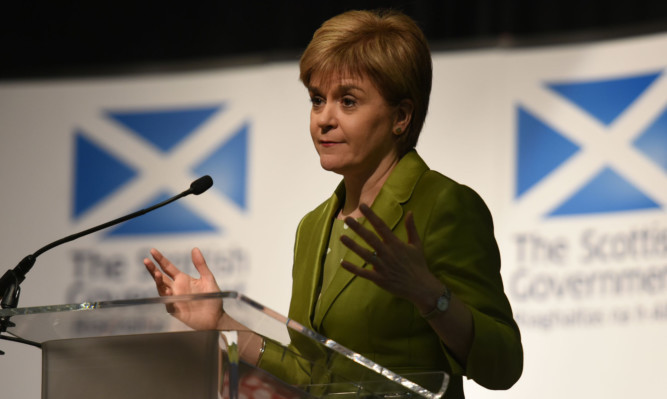Expected cuts to tax credits in the Budget will hit Scotland’s poorest families hard and could put the economic recovery north of the border under threat, the First Minister has warned.
Nicola Sturgeon claimed if George Osborne makes the widely anticipated reductions, 500,000 children in families in Scotland which receive tax credits could lose out.
The Chancellor will unveil the first Conservative Budget for 18 years when he reveals his spending plans to MPs tomorrow.
Tax credits provided £2 billion additional cash to households in Scotland in 2013-14, with two-thirds going to help families in low paid work with children
But the Scottish Government believes a 10% cut in child tax credit would cost families north of the border £150 million a year, while a 10% cut in all tax credits would leave households £250 million worse off.
Reducing child tax credits to 2003 levels would result in the loss of £650 million, or £425 million if this was adjusted for inflation, according to SNP ministers.
Ms Sturgeon argued that tax credits “form an important part of the tax and welfare system, designed particularly to support working families on low incomes”.
The SNP leader said: “More than 500,000 children in Scotland benefit from tax credits. Two-thirds of the £2 billion expenditure on tax credits in 2013-14 went to low income working families with children and only 5% to households without children.
“If, as we expect, the UK Government targets tax credits for cuts in tomorrow’s Budget, it will hit Scotland’s poorest children and families hard. It is a frightening indication of the potential impact of the expected cuts in tomorrow’s UK Budget.”
She argued the continuing austerity from the Tories is “economically counter-productive”, adding: “We want to support people to get into work and to stay in work and the tax credit system provides important practical help to families on low pay.
“These are people who are in jobs and often working very hard for relatively little pay. It is unfair that their children are the people made to pay for the mistakes of the austerity approach – not to mention economically counter-productive.
“When people are in work, they spend their wages in the local economy, leading to a virtuous circle. Cutting child tax credits back to 2003 levels, as we expect the UK Government to do tomorrow, will risk threatening Scotland’s economic recovery.
“The deficit needs to be reduced but this should be done in a more gradual manner with more resources allocated to a programme of additional investment in our economy, rather than risking a financial body-blow to hard-working parents and their children.”
